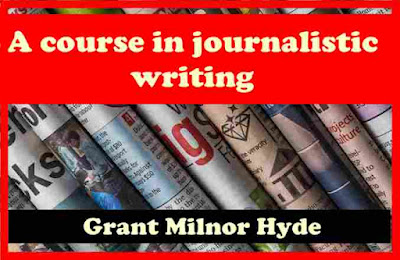A course in journalistic writing The title of a book is often the hardest part to write. The title of this book is admittedly a compromise....
A course in journalistic writing
The title of a book is often the hardest part to write. The title of this book is admittedly a compromise. When the manuscript was submitted to various high-school and college teachers of the subject, each suggested a different title to express the content and purpose of the work — ''^ews Writings" ^'English Composition with Journalistic Exercises/' ^^Beginnings in Journalism/' ^'Journalistic Writing/'' and others.
The author admits that none exactly suits his idea, although essentially all signify the same effort — to utilize the interest in newspaper writing in the task of teaching students to write. To one teacher this may be merely English composition; to another, it may be vocational or pre-vocational training. Each, however, is likely to use the same materials in much the same way.
Whatever the title may be, the author has endeavoured to put together the ingredients found in most courses of this type.
The book is a new departure in that it is not concerned with journalism in the professional sense, as have been tho books written for newspaper workers and for students in the fully organized schools of journalism in the universities.
It does not purpose to train newspaper workers, but it aims to be a textbook and course outline for teachers who are using newspaper writing as a stimulus to student effort in composition. So many teachers have been successful of late in the use of this new method of teaching that the idea is no longer experimental or particularly novel, whether it is done in a regular English course or in a so-called course in ''journalism" or "newspaper writing."
The number of these courses is multiplying at an extremely rapid rate. But many of the teachers, especially those who have had little newspaper experience, have expressed the need for a textbook and course outline prepared primarily for their work.
In an effort to aid them, the author has attempted in this book to put on paper such of the methods and materials of the schools of journalism as would seem most usable and valuable. In doing this, he has tried to turn to account his twelve years of experience as a teacher of journalism and his work as a writer and editor for newspapers and magazines. His point of view is that the task involved in these courses is not so much vocational or professional training as teaching the art of writing through the use of practice material that is interesting and close to the students' daily lives — so close that they will approach writing with eagerness, rather than with repugnance.
The effort is to turn out, not trained journalists or newspapermen, but high-school and college graduates who can express their thoughts on paper.
The success attained by the teachers of this new subject has demonstrated the theory, long-held by some teachers, that the value of practice writing depends largely upon the subject matter. Much high-school and college composition work do not give adequate training in wilting because it lacks interest, because its models and exercises are remote from the student's daily life, and because it appears to have no '^practical" value.
It has long been evident that more familiar, "practical" models were needed. The teachers of journalism have found that the writing of articles like those published in the newspapers and magazines is keenly interesting, and the things w^ritten about in such articles are as close to the student's life as any other subjects that might be chosen. The daily newspaper, furthermore, is a valuable model because it contains both good and bad examples. While much of its writing is hastily and artistically done, a considerable portion is extremely effective and finished. Selection and study of its examples develop discrimination.
Some contents:
Journalistic Writing
What the Newspaper Contains.
Elements of Interest^
Newspaper Policy.
Narration. Kinds of News
Building a Narrative The Writing Staff.
Paragraphs —.The Mechanical Force
Narratives with a Purpose The Business Office
Writing Human Interest Stories - Kinds of News Emphasized Sentences,
The FrontPage.
Description
The City Editor.
Writing a Description City News Sources
Use of Words ^
The Telegraph Editor
Exposition
Press Associations
What the Newspaper Contains.
Elements of Interest^
Newspaper Policy.
Narration. Kinds of News
Building a Narrative The Writing Staff.
Paragraphs —.The Mechanical Force
Narratives with a Purpose The Business Office
Writing Human Interest Stories - Kinds of News Emphasized Sentences,
The FrontPage.
Description
The City Editor.
Writing a Description City News Sources
Use of Words ^
The Telegraph Editor
Exposition
Press Associations
Download 20 MB










